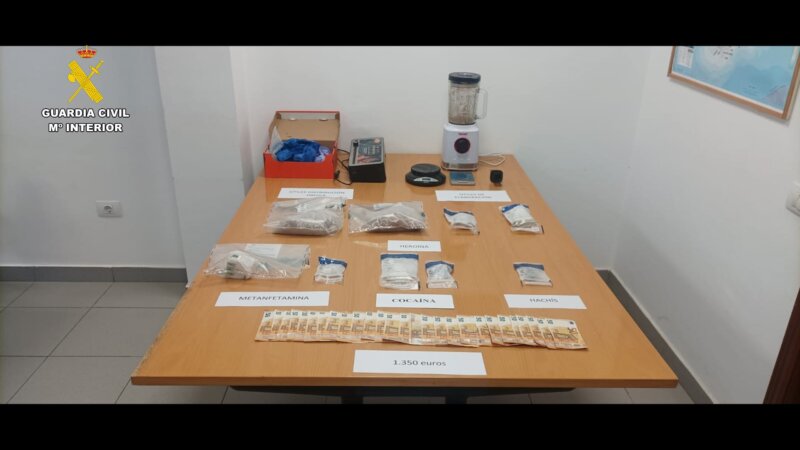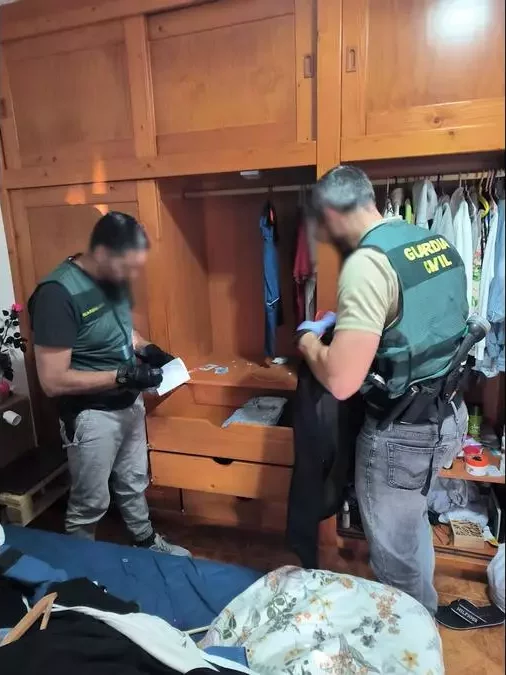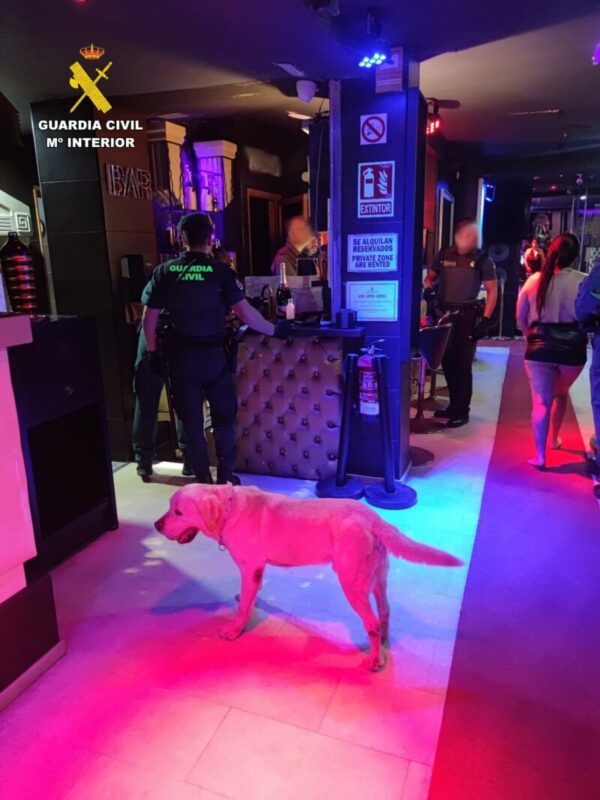
Nonetheless, there are many residents and visitors who express dissatisfaction with the blatant scale of dealing openly in some areas, particularly nightspots connected to tourism. While drug dealing is not new, nor unique, to tourist areas around the world, there are many who feel that the police simply turn a blind eye, and do too little to curb what they say is obvious harassment of tourists who wander around particular areas at night. Some shopping and leisure centres in the south have been marked out by street dealers as places where it is apparently safe for them to continually approach tourists, targeting in particular young men who visit the array of late night bars and clubs.
While some members of the public suspect police corruption to be the only likely explanation for street dealers operating with impunity, the fact is often a lot more complex, whether it be the large numbers of individuals involved who covertly warn each other whenever law enforcement may approach, or indeed those bar owners who themselves see a benefit from allowing drug deals to continue in the areas around their venues. There are even stories of some bar owners and DJs being directly involved in the illicit trade, supplementing their business model of cheap drinks and a don’t ask, don’t tell mentality.
One thing is clear, the idea of pretending it doesn’t happen has led to an apparent increase the numbers of dealers targeting foreign visitors in at least one or two areas, pretending not to notice does not stop the trade, and in fact simply encourages ever more brazen approaches which many visitors then talk about on social media, but persistently fail to report to the authorities, meaning the true scale of the problem is apparently never officially recorded.
Often it seems that local law enforcement is powerless to stop the trade, though on occasion Guardia Civil units from the capital take the lead in ensuring that dealers are made aware that this is seen as a serious issue, and not just a local one to be expected in popular resort areas. None the less some of these larger operations appear to yield much lower rates of confiscations than might be expected, and of course that leads to greater suspicions of corruption among law enforcement teams in the south.
Operation in Mogán: A Focused Effort on Nightlife Venues
The Guardia Civil and the Local Police of Mogán conduct a joint police operation in leisure areas of the town of Mogán.
PROVIDED BY GUARDIA CIVIL
On March 15, 2024, a coordinated operation between the Guardia Civil and the Mogán local police led to the inspection of eight nightlife venues in the municipality. This operation was part of a broader strategy to address drug trafficking and consumption in leisure areas. The authorities succeeded in seizing a variety of drugs, including hashish, pollen, and cocaine, alongside illegal weapons and unauthorized pharmaceuticals. The primary goal was to disrupt the drug supply to consumers and eliminate drug trafficking and possession in public and leisure spaces.
In a coordinated effort to combat the retail drug trade and drug use in entertainment venues, a joint operation was carried out by the Guardia Civil of Gran Canaria and the local police of Mogán.
The operation focused on several shopping centers in the municipality of Mogán, a known hub for nightlife and entertainment. A total of eight nighttime leisure venues were inspected, resulting in the seizure of narcotics, illegal weapons, and unauthorized pharmaceuticals.
The Details of the Operation
A combined force consisting of the Guardia Civil from the Puerto Rico Main Post, Mogán local police officers, members of the Vecindario Company, and the canine unit of the Guardia Civil from Las Palmas, conducted inspections across eight venues within the locality. The operation led to the seizure of various drugs, including 5 grams of hashish, 4 grams of pollen, and 7 grams of cocaine. Prohibited weapons, including an extendable baton, and illegal pharmaceuticals, including 9 pills of sildenafil (Viagra) and 5 pills of anxiolytics (Trankimazin), were also confiscated.
The inspections weren’t limited to controlling the sale, consumption, or possession of drugs; they also included administrative inspections of the venues. Several establishments faced sanctions under the law regulating measures against smoking and the sale, supply, consumption, and advertising of tobacco products.
This joint operation aims to underscore the commitment of local and national law enforcement agencies to maintaining safety and legality within leisure spaces in Mogán. Through these efforts, the authorities aim to deter criminal activities associated with drug trafficking and ensure a safer environment for both residents and visitors in the region.
However the results, while acting as some form of warning to criminals, cannot really be said to be representative of the apparent scale of the problem, with various gangs known to wander around some of these nightspots in quite large numbers, the amounts of substances seized does not appear to tally up with the sheer quantity of individuals apparently seeking to profit.
Previous Operation in Arucas: A Major Blow to Drug Trafficking
 Another seemingly more significant operation took place in the northern municipality of Arucas, following an extensive investigation triggered by a violent robbery reported on February 26. The Guardia Civil arrested a 40-year-old man, accused of a public health crime related to drug trafficking. The operation uncovered over 1,000 euros in cash, and a substantial amount of narcotics, including heroin, methamphetamine, hashish, and cocaine. This arrest led to the dismantling of what appears to have been a major drug distribution point, well away from the bright lights and late night venues of the touristed south, and highlighted a connection between violent crime and drug trafficking.
Another seemingly more significant operation took place in the northern municipality of Arucas, following an extensive investigation triggered by a violent robbery reported on February 26. The Guardia Civil arrested a 40-year-old man, accused of a public health crime related to drug trafficking. The operation uncovered over 1,000 euros in cash, and a substantial amount of narcotics, including heroin, methamphetamine, hashish, and cocaine. This arrest led to the dismantling of what appears to have been a major drug distribution point, well away from the bright lights and late night venues of the touristed south, and highlighted a connection between violent crime and drug trafficking.
On March 8, the Guardia Civil arrested a 40-year-old man in Firgas, Gran Canaria, marking a breakthrough in a complex investigation into drug trafficking and associated crimes. This individual, suspected of a public health offense related to drug trafficking, was found in possession of over 1,000 euros in cash, drug distribution paraphernalia, 880 grams of heroin, 162.1 grams of methamphetamine, 13 grams of hashish, and 5.1 grams of cocaine in his residence.
The arrest dismantled a known drug distribution point and followed a meticulous investigation initiated by the Guardia Civil after a woman reported a violent robbery at her establishment in Arucas on February 26. During the incident, several items were stolen, and the owner sustained injuries to her forearms while attempting to prevent the theft, necessitating medical treatment.
In response to this violent episode, Guardia Civil agents collected comprehensive data and, supported by security camera footage and community cooperation, identified the perpetrators. This led to the arrest of four individuals, aged between 17 and 40, all implicated in the robbery.
 Further investigations revealed potential involvement in a continued domestic abuse offense and drug trafficking by one of the suspects. The Guardia Civil confirmed the occurrence of gender violence, identifying a victim who had suffered injuries in two separate incidents, one of which required hospital treatment, blood transfusions, and surgery.
Further investigations revealed potential involvement in a continued domestic abuse offense and drug trafficking by one of the suspects. The Guardia Civil confirmed the occurrence of gender violence, identifying a victim who had suffered injuries in two separate incidents, one of which required hospital treatment, blood transfusions, and surgery.
As the investigation into the domestic abuse case unfolded, surveillance by the Guardia Civil in Arucas unveiled sufficient evidence suggesting another suspect’s involvement in drug trafficking. This discovery prompted a judicially authorized search of the suspect’s home on March 8, resulting in the seizure of a significant quantity of drugs, including 1078.74 grams of heroin, 3.66 grams of cocaine, 145.38 grams of methamphetamine, 12.9 grams of hashish, and 23.03 grams of an unidentified powdered substance. Additionally, 1,350 euros in cash and various drug distribution tools, such as precision scales, a mixer for drug preparation, and a packaging machine, were confiscated.
This comprehensive operation culminated in the arrest of the main suspect for drug trafficking, revealing evidence of involvement by his partner. Both the detainee and associates were brought before the court in Arucas
Comparative Analysis and Impact
While the operation in Mogán focused on leisure venues and aimed to reduce visible drug availability to consumers, the operation in Arucas targeted a significant drug trafficking operation linked to a series of violent crimes. Both operations underline the multifaceted approach of law enforcement agencies in tackling the drug problem on the island.
The operation in Arucas also uncovered a continuous crime of domestic abuse and a case of gender violence, emphasizing the broader social implications of drug trafficking activities. The intervention allowed for the assistance and identification of a victim of gender violence, further illustrating the interconnectedness of various forms of criminality.
In conclusion, these operations not only reflect the proactive stance of the Guardia Civil and local police forces against drug trafficking and related crimes but also highlight the complexity of the drug problem in Gran Canaria. By targeting both the supply and distribution of drugs, these operations do contribute to the safety and well-being of the community, demonstrating a commitment to addressing not only the symptoms but also the root causes of drug-related crimes.
Nonetheless there are residents of the touristed south who feel that much more could be done, as they say they witness constant street dealing on a daily basis, and yet despite frequent police patrols they feel absolutely nothing is being done to tackle or discourage the open supply of narcotics to tourists he seem to sense no issue with purchasing a range of substances from individuals who operate in plain view, and who some fear may be capable of great violence if questioned or reprimanded by members of the public.
Editor’s thoughts:
Regardless of your politics or opinions regarding recreational drug use, or the law, or supply driven by a clear demand, many bar owners are exasperated, some feeling powerless to protect their clientele beyond the walls of their own venues, and even feeling that they have to hire private security to ensure no threatening behaviour or illicit activities are occurring in front of families and other holiday makers who have no interest in getting high or dealing with criminals. Others see no problem in the status quo, looking the other way, living and let live and, of course, profiting from open criminality on our streets. Where will it all end?
While drug use is not rife here, it is visible in several places and, in the end, that deters family tourism, which is the life blood of this economy. Either we aim higher, or we allow the situation to descend further. We all have a stake in this.

